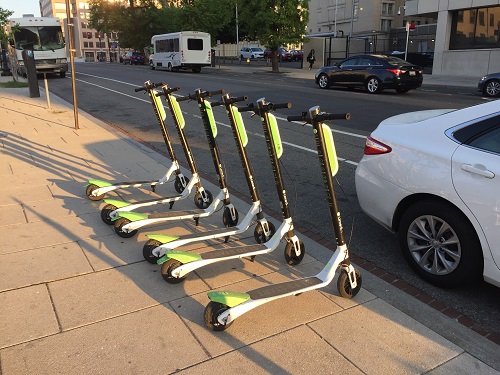A new study compiled by data platform management firm Populus indicates that the popularity of electric scooters as an urban transportation option continues to increase in major U.S. metropolitan cities.
Yet one potential roadblock that might slow broader use of two-wheeled scooters is that most city and state laws do not allow them to operate on public roads – a problem that would need to be resolved by new transportation policy initiatives, according to Populus’ analysis.
Released in mid-July this year, the study is based on data from more than 7,000 residents of major U.S. cities, with 70 percent of them viewing electric scooters “positively” in part because “they are a convenient replacement for short trips in a personal vehicle or ride-hailing service and are a complement to public transit.”
Populus’ researchers said in the report that the introduction of “e-scooters” is part of a broader investment trend in “micro-mobility,” which is a catch-all term encompassing a range of human- and electric-powered transportation solutions such as bikes, scooters, and mopeds.
 “It is widely believed that as cities become more urban and streets more crowded, micro-mobility services could more effectively replace personal vehicle and ride-hailing trips, as well as deliver first- and last-mile solutions for public transit,” the report noted. “In fact, our analysis of the most recent national transportation data indicates that over 45 percent of the trips made in the United States are three miles or less, and that 78 percent of those trips are now made by personal vehicle.”
“It is widely believed that as cities become more urban and streets more crowded, micro-mobility services could more effectively replace personal vehicle and ride-hailing trips, as well as deliver first- and last-mile solutions for public transit,” the report noted. “In fact, our analysis of the most recent national transportation data indicates that over 45 percent of the trips made in the United States are three miles or less, and that 78 percent of those trips are now made by personal vehicle.”
Yet the study emphasized that transportation planning and policymaking in the age of new mobility services “is a challenging endeavor” given the current pace of change.
“Over the past decade, there has been limited information and data on the adoption and use of new mobility services available to cities, making it ever more difficult for cities to develop appropriate policies and transportation plans,” it added.
Right now, many city and state departments of transportation restrict scooter usage as a mode of urban transport.
For example, in April the city of Seattle restricted deployment of electric scooters until “proper permits” were obtained. And in Wisconsin, motorized scooters may not be operated legally on public roads or sidewalks within a roadway’s right-of-way.
“Motorized scooters do not meet federal safety equipment standards for motor vehicles and are not designed for operation on roadways,” noted the Wisconsin DOT on its website. “Therefore, the law treats motorized scooters like lawn tractors, all- terrain vehicles, go-carts, mini-bikes and other off-road motor vehicles that are not allowed on public roads.”
For those and other reasons, the Populus study recommended three “primary goals” of policy/regulatory focus for states and cities going forward where electric scooters are concerned:
- Ensuring safety: What policies should be enacted to ensure the safety of riders and others using public space, e.g., streets and sidewalks? What transportation planning and design modifications are possible to promote the safety of those using shared and personal micro-mobility options and others in the public right of way?
- Evaluating impacts on traffic and sustainability: How do micro-mobility services fit into the broader transportation ecosystem? Are they reducing vehicle trips? How many micro-mobility vehicles can the residents of a city effectively utilize?
- Promoting equitable access to services: Are micro-mobility services accessible, and being utilized, by a broad segment of the population? If not, how can the city support expanding access to disadvantaged populations?
“The relatively significant adoption of e-scooters in a short period of time suggests that they appeal to a fairly broad segment of the population,” the report concluded. “That could also influence transportation policies and planning efforts such as expanding bike lanes and adopting congestion pricing to promote the efficient use of road space.”
 Nation
Nation
Georgia DOT’s McMurry Wins ITS Lifetime Award
August 29, 2025 Nation
Nation

